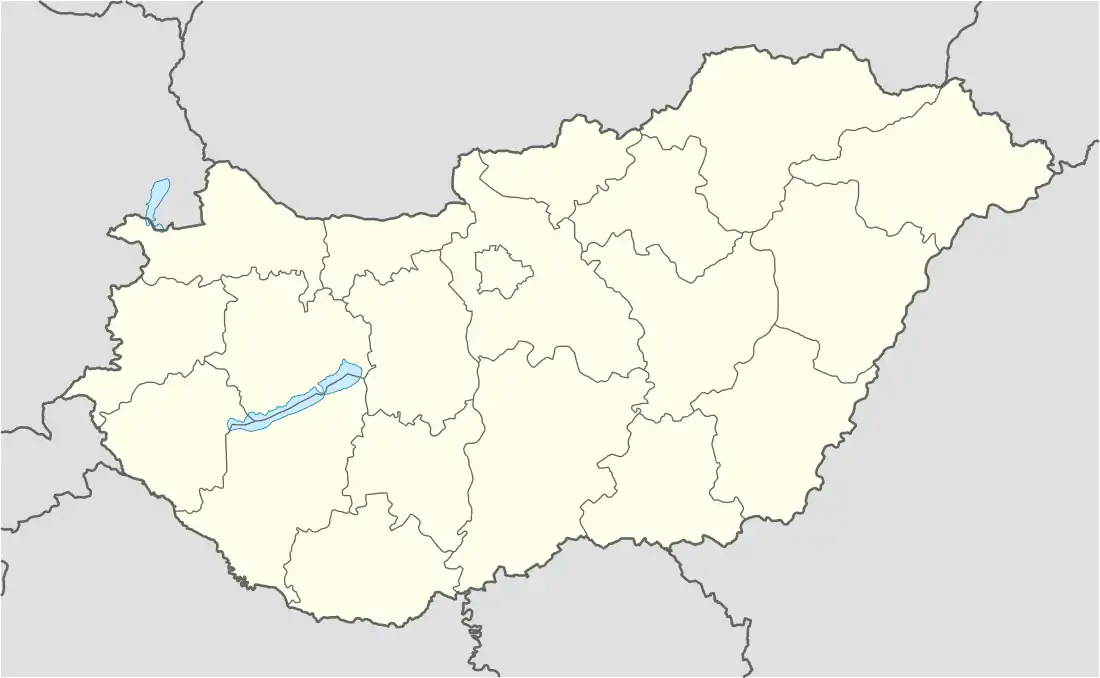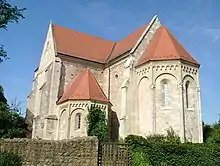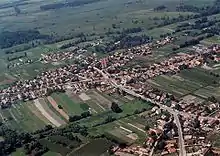Ócsa | |
|---|---|
_7.jpg.webp) Ócsa | |
 Flag  Coat of arms | |
 Ócsa Location of Ócsa | |
| Coordinates: 47°17′36″N 19°13′34″E / 47.29341°N 19.22598°E | |
| Country | Hungary |
| County | Pest |
| District | Gyál |
| Area | |
| • Total | 81.64 km2 (31.52 sq mi) |
| Population (2007) | |
| • Total | 8,953 |
| • Density | 108.68/km2 (281.5/sq mi) |
| Time zone | UTC+1 (CET) |
| • Summer (DST) | UTC+2 (CEST) |
| Postal code | 2364 |
| Area code | (+36) 29 |
| Website | ocsa |
Ócsa is a town in Pest county, Budapest metropolitan area, Hungary. 30 kilometers south of Budapest.
Árpád Age Romanesque church


The church was originally built in the 13th century by the Premonstratensians for use as a monastery. During the 16th century the village was reformed and the structure was given to the village for use as a public place of worship.
One of the most beautiful Romanesque churches preserved in Hungary, it has 3 naves, a cross nave, and two western towers, following the style common to Hungarian medieval architecture. It was renovated in the 20th century, according to the plans of modern-day architect Ernő Foerk. The church is interesting not only for its architecture, but for the murals of Saint Ladislaus I of Hungary, the Legendary painted on the northern walls.
Numerous preserved houses and structures in the vicinity recall the life and times of the Hungarian medieval age, including tools, furniture, and other objects of interest.
Bird observatory
A long-standing bird observatory known as the Ócsai Madárvárta is located nearby.
Notable residents
- Tamás Csilus, footballer.
Twin towns – sister cities
 Dalgety Bay and Hillend, Scotland, United Kingdom
Dalgety Bay and Hillend, Scotland, United Kingdom Kose, Estonia
Kose, Estonia Plášťovce, Slovakia
Plášťovce, Slovakia
References
- Gerevich Tibor: Magyarország románkori emlékei, (Romanesque Heritage in Hungary.) Királyi Magyar Egyetemi Nyomda, Budapest, 1938.
- Gerő László (1984): Magyar műemléki ABC. Budapest,
- Henszlmann Imre: Magyarország ó-keresztyén, román és átmeneti stylü mű-emlékeinek rövid ismertetése, Királyi Magyar Egyetemi Nyomda, Budapest, 1876.
- ↑ "Testvérvárosaink". ocsa.hu (in Hungarian). Ócsa. Retrieved 2 January 2020.
External links
- Official website in Hungarian
- Ócsa for tourists
- lap.hu links about Ócsáról
- Natural protection district near Ócsa
- Aerial images about Ócsa
- Street map (in Hungarian)

